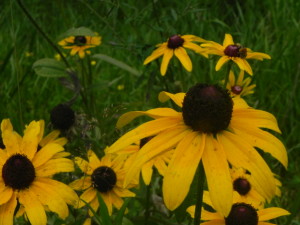By Jonathan Stauffer
Several experiences in the natural world heightened my self-awareness and spirituality. These experiences began as a child living in the country and continue into my adult life. I once took for granted the value of Earth, but these experiences built the case for greater appreciation and protection of God’s creation.
I grew up on a family farm and had many outdoor experiences through work and play. One of my jobs during the summer was to pull weeds out of the corn fields. I fed calves as a part of our dairy operations as a year-round job. Each of these tasks gave me a sense of what living things need to grow, which I attribute as an early ecological awareness. I also had time to play on the farm. I pulled off the heads of dandelions and climbed trees. On clear nights, I beheld a multitude of stars. Looking back, these childhood memories often contained moments of wonder.
By my high school years, however, my attitude had changed. I underestimated the value of outdoor experiences, and I did not see farming as an appealing profession. My interests focused on science, and I wanted to become an engineer. I studied physical sciences as an undergraduate at Manchester where I learned about universal laws of nature as they pertain to energy and matter. I also realized concerns arising from pollution and climate change that I felt needed solutions. But looking back, my efforts to understand the crisis focused more on human interests than the broader issues of ecology.
A profound change to my ecological awareness came about 7 years ago. I agreed to teach nature classes at a Brethren youth camp with my friend, Randall Westfall. Randall introduced me to wilderness awareness skills. I learned practices for how to walk quietly, listen intently, and observe carefully in whatever place I walked. These practices added a greater definition to my vocabulary of the natural world and invoked my childhood wonder once again. I also received joy from teaching the youth some of these same wilderness techniques because I saw their own spiritual and intellectual growth develop at camp. From these experiences, I have a continued interest to serve in outdoor ministry and learn about the local place that I reside.
I believe that wilderness skills are practice that contributes to human wholeness. Over time, I studied field guides to develop further knowledge of plants and animals. I learned about the ecology in my region. I no longer saw trees as green tops and brown trunks, but distinguished them by their leaves and bark. I memorized the features of several common medicinal plants and a few common bird songs. In this way, my awareness of biodiversity within creation increased, which is a natural order that God allows humans to comprehend.
Of course, there are also natural hazards that humans must heed. Caution towards the wilderness is not just for our own protection, but also serves to protect the rest of creation. We are reminded that God established creation a long time before humans came on the scene. As powerful as human knowledge has become, we are still limited in understanding the processes of the wild. Natural hazards provide a wisdom that humbles and sets ecological boundaries.
We must remember that humans are not detached from the creation. I believe wholeness (Shalom) includes turning to sustainable farming practices as well as developing renewable energy technology alongside ecological conservation. In order to best enable these changes we need to increase our understanding of the ecological processes that benefit our daily lives and pattern our build environments after them. Failure to do so will harm all creatures, including humanity.
Today, I view creation not only as a means through which God provides our food and fiber, but also as places for renewal and revelation. From this understanding of creation, I am grateful for the sacred intent that the Creator gives through nature. Such an understanding fosters simple living by assessing what are truly basic needs and what are empty desires. In fact, I question the accelerated pace of technology over the last fifty years, and wonder whether there are limits to its perceived benefits. I now am concerned about wholeness for both human and non-human inhabitants of the planet Earth.
As Christians, we have a responsibility to care for God’s Earth. Reading the Bible enhances our ecological imagination in addition to faith formation. Beyond the account of creation in Genesis, poems and wisdom teachings in the Old Testament relate to nature (Psalm 104 and Job 38-39). In the New Testament, the parables of Jesus employ nature as analogies for the kingdom of heaven (e.g. Matthew 13). Human interests are deeply intertwined with other creatures and the land, and God intended creation to be this relational. The Creator establishes these relationships to keep us in communion with all living things and the Divine.
As Brethren, we have traditions of simple living and covenant relationship, lifestyles that foster wholeness and aid in restoring the planet. Let us enjoy the God-given benefits of creation while also relieving the pain that we and other humans impose on it. Failure to act will be a missed opportunity in witnessing to the abundant living that Christ modeled for us.
Jonathan Stauffer is a member of the Polo (IL) Church of the Brethren congregation. He is currently a student at Bethany Theological Seminary and beginning his second year in the Master of Arts program with a concentration in theological studies.



